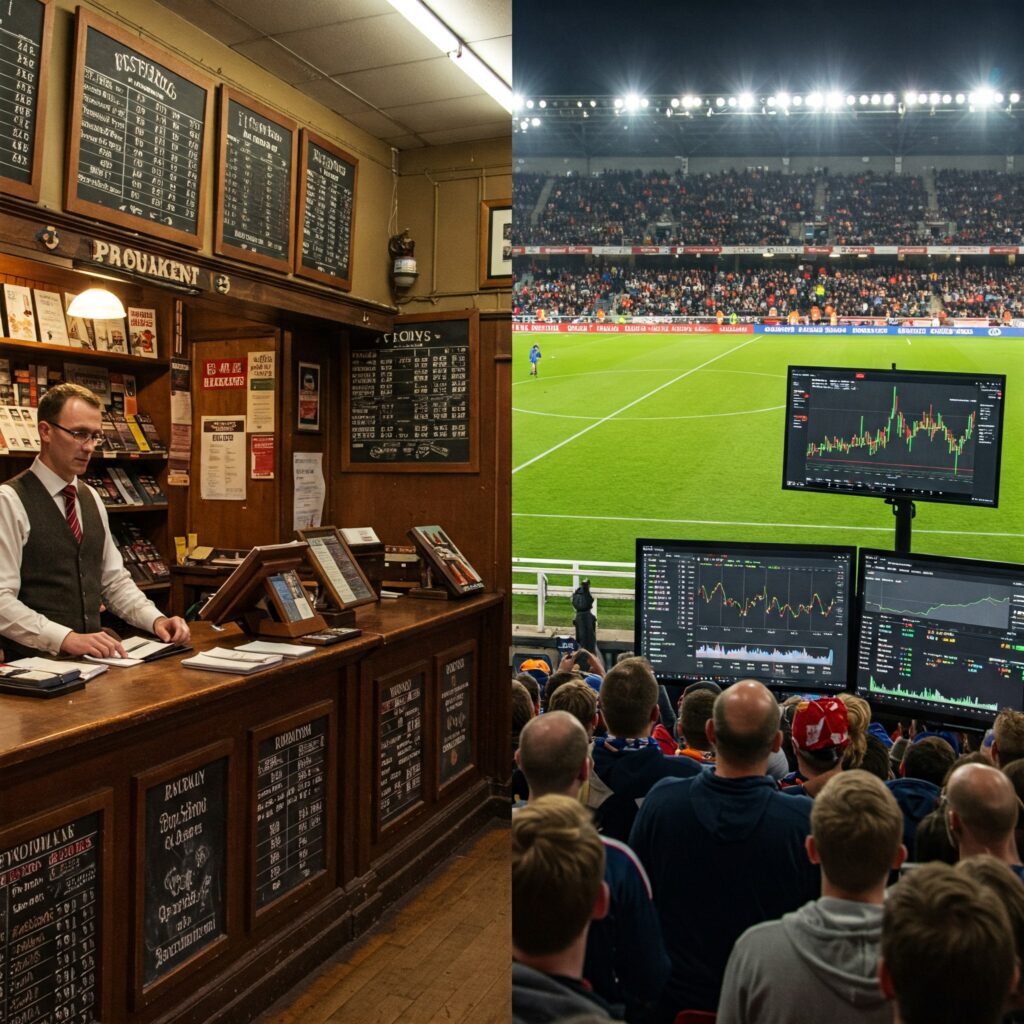As I settled into my regular Saturday routine, one that has become almost sacred over the years, I couldn’t shake the feeling that something was about to change. The sun cast long shadows on the bustling streets, where fans adorned in their team colors made their way to the stadium. The anticipation was palpable, and the thrill of placing bets was always a key part of my game day experience. But as I prepared to make my wagers, I found myself at a crossroads: should I stick with my traditional bookmaker—or venture into the world of betting exchanges?
For those who are new to this vibrant landscape, let me take you on a journey to explore the nuances between these two betting methods that have captivated millions. Traditional bookmakers have been around for what feels like an eternity, offering a familiar setting: fixed odds and a straightforward approach. You have your favorite teams or players, you place your bet, and you either celebrate the win—or ponder what went wrong over a post-game drink.
However, betting exchanges have emerged as a formidable alternative, offering a thrilling twist to the betting experience. Picture this: instead of simply placing bets against a bookmaker, you become a player in a larger marketplace. You can set your own odds, accept bets from other users, and even lay down bets against your predictions—truly a game-changer. It’s like trading on the stock market, where every bettor has a role to play, and the outcomes can be as uncertain as they are exhilarating.
As I dipped my toes into the world of exchanges, I couldn’t help but recall my initial hesitation. Would they be as reliable as the bookmakers I had trusted for years? It was a gamble in itself, but I was eager to see if I could turn my insight into an advantage. While traditional bookmakers operated on set limits and margins, betting exchanges promised the potential for more favorable odds and greater flexibility—qualities that intrigued me like the final minutes of a nail-biting match.
As I began my journey, I soon realized that the choice between betting exchanges and traditional bookmakers is more than just a matter of preference—it’s about understanding the nuances of each and learning when to leverage their unique strengths. After experiencing both worlds, I felt more empowered, capable of tailoring my betting strategy to fit the unfolding drama of every sports event.
In the following sections, we will delve deeper into the key differences in odds and margins, consider when best to utilize exchanges, and break down the complexities of liquidity and commissions. Whether you’re a novice just starting or a seasoned bettor looking to sharpen your strategy, there’s much more to uncover in this thrilling realm of betting.

Key differences in odds and margins
When I first dipped my toes into the vibrant world of gambling, I was a wide-eyed novice navigating between the familiar streets of traditional bookmakers and the fascinating alleys of betting exchanges. It was like stepping into two distinct universes, each with its own set of rules and charms. As I delved deeper, the differences in odds and margins became strikingly clear, shaping my approach to betting forever.
Traditional bookmakers operate on a simple principle: they set the odds based on their own analysis and margin, which ultimately determines their profit. This margin can often be significant, sometimes reaching up to 15% or more, depending on the sport and the nature of the bet. For the uninitiated, this means that every time you place a bet, a portion of your stake quietly disappears into the bookmaker’s profit margin.
On the other hand, betting exchanges flip this model on its head. Here, the delight lies in the freedom to set your own odds. Imagine standing in a bustling marketplace, where you can negotiate the price of your favorite item instead of accepting a fixed price. This is how betting exchanges operate, allowing users to offer odds against one another. As a result, the margins are significantly lower — often between 2% and 5%. For a bettor, this means more value and potential returns on successful wagers.
When I first discovered this aspect, it was like a lightbulb moment. I realized that by utilizing exchanges, I could not only find better odds but also engage in strategies that simply weren’t possible with traditional bookmakers. For instance, if I believed a team was undervalued, I could set a higher price and essentially make a market for others to bet against me. It felt less like gambling and more like trading, adding an exhilarating layer to my betting experience.
- Odds: Traditional bookmakers offer fixed odds, while betting exchanges allow users to set their own.
- Margins: Bookmakers often take a larger margin, whereas exchanges typically have lower margins, resulting in potentially higher returns for bettors.
- Value: The ability to find better odds on exchanges can lead to increased profitability over time if utilized effectively.
In summary, understanding these key differences in odds and margins opened up a new perspective for me as a bettor. It was not just about luck anymore; it was about knowledge, strategy, and, most importantly, seizing opportunities that the market presented. As I continued on my gambling journey, this fundamental understanding shaped my decisions, paving the way for both thrilling wins and valuable lessons along the way.
When to Use Exchanges
Imagine it’s a tense Saturday afternoon, the sun is shining, and you’re sitting at home, your heart racing as you watch your favorite football team take the field. You’ve scoured the news, analyzed the stats, and yet, deep down, you have a gut feeling that today is going to be different. This is the moment when betting exchanges can become your best friend.
Betting exchanges offer a unique opportunity for punters who want to take control of their betting experience. Unlike traditional bookmakers, where odds are fixed and margins are built into the prices you see, exchanges give you the power to set your own odds. This flexibility allows you to capitalize on your intuition, especially in situations where you believe that the odds don’t accurately reflect the true probability of an outcome.
- Late Bets: If you think a team is underestimated just before kickoff, you can place a bet at higher odds than those offered by traditional bookmakers. The exchanges enable you to act on your instincts in real-time.
- Matched Betting: For those who love to play the odds, exchanges are perfect for matched betting. If you know a bookmaker is offering a bonus, you can back and lay the same outcome, minimizing your risk and ensuring a profit.
- In-Play Betting: The excitement of live betting is best experienced on an exchange. Picture this: your team scores an unexpected goal, causing the odds to fluctuate rapidly. With an exchange, you can quickly place your bet based on dynamic market conditions, seizing opportunities others might miss.
- Arbitrage Opportunities: For the savvy bettor, exchanges can be a goldmine. By comparing the odds on various platforms, you can often find discrepancies that allow for risk-free betting through arbitrage.
However, it’s important to note that while betting exchanges can be advantageous, they may not always be the best choice. If you’re a casual bettor looking for a simple and quick experience, traditional bookmakers account for convenience. But, if you’re in the market for maximizing your potential payouts and enjoy putting your analytical skills to the test, exchanges will serve you well.
Ultimately, the choice between betting exchanges and traditional bookmakers becomes a personal one, informed by your knowledge of the game, your confidence in your betting decisions, and how much control you want over your betting experience. Next time you’re faced with a crucial betting decision, take a moment to assess the situation. You might just find that the freedom offered by exchanges is precisely what you need to make that gut feeling pay off.
Liquidity and commission explained
Imagine it’s a Saturday afternoon, and the air is thick with anticipation. The local football match is about to kick off, and excited whispers fill the pub. As I prepare to place my bets, I find myself torn between traditional bookmakers and betting exchanges. My mind drifts to the crucial elements of liquidity and commission, which can dramatically shape my betting experience.
Let’s start with liquidity. This term refers to the availability of money in the betting market, which determines how easily you can place a bet and get matched with another bettor. In traditional bookmakers, liquidity is often limited by the odds set by the house. The bookmaker holds the monopoly over the betting odds and decides how much money they’re willing to risk. Consequently, if you find yourself wanting to place a substantial bet, you might face restrictions or unfavorable odds.
On the other hand, betting exchanges operate on a different principle. Here, bettors create the market by offering their odds to one another. The liquidity in exchanges is influenced by the volume of bettors willing to back or lay a certain outcome. This organic flow of betting activity often leads to better odds, especially as more people engage with the exchange. I remember a time when I managed to secure odds that were significantly better than those offered by a local bookmaker simply because there was a large pool of participants actively betting on the same event. It felt like finding a hidden gem amidst the noise!
However, with this power of liquidity comes the notion of a commission. Betting exchanges charge a fee on winnings, typically around 2-5%. While this might seem daunting, especially given the competitive nature of odds in exchanges, it’s a necessary part of sustaining a platform where all sellers and buyers (bettors) can co-exist. This model fosters a sense of community and fairness as you are essentially betting against other users instead of a monolithic bookmaker.
As I examined my past experiences, I realized that, with careful selection, the commission on exchanges can be overshadowed by the potential for better odds. Understanding when and where to place my bets, I learned to navigate these waters with finesse. When I wagered large sums through exchanges, the commission became a minor concern compared to the enhanced payouts I received due to superior liquidity.
In summary, knowing the dynamics of liquidity and commission can make all the difference in your betting strategy. Whether you’re new to the scene or a seasoned bettor, appreciating these elements allows for smarter wagering decisions, ultimately enhancing enjoyment and financial returns in the thrilling world of gambling.

